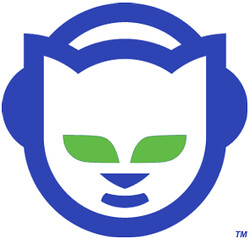Napster logo by Dj tronick through CC Licensing
A lot can change in just a short amount of time. For years we were all paying for music outright. Sure, we didn't think about not paying for the music on the TV or radio, but you had to buy a TV or a radio and most places don't have local music channels (meaning one would have to pay for cable TV). Then, around the turn of the century, something beautiful happened. We were given free access to audio. It was a big shock to record companies at the time as they all scrambled to say it was illegal when it was, in fact, completely legal. It would have only been illegal if Napster made money off of our downloading. Think of it this way, when you buy a CD as a present for your friend, your friend doesn't have to pay anything. Napster just turned us all into gift givers. Unfortunately, since the people who have money are the ones who make the laws that force us into giving them more money, it wasn't long before Napster went away. It came back as a pay to download site similar in function to iTunes. Napster's blog recently mentioned that it is merging with Rhapsody which I believe is the Real Player equivalent to iTunes. Unfortunately, it is more accurate to say that Napster is being absorbed and will be completely gone after a 12 year history. Another blog article on the subject can be found here.
On a fun side note, my high school firewalled napster.com, but they didn't do a very good job because we just typed napster.com/download and completely circumvented it.
Even though Napster didn't stay a free download service for long, it caused a series of similar programs to come into fold. The next few years gave us Kazaa, WinMX, Limewire, Frostwire, Morpheus and so on (many of which have been shut down as well). As internet connections got faster, people started sharing larger and larger files. Although music is pretty much at the core of internet downloading.
As I said, the recording industry launched a full attack to the best of its ability against p2p file sharing, but it was not without deep criticism. Artists who were against downloading got a very heavy negative image. Case in point, Metallica. One of the most beloved bands of the last 30 years lost a lot of fans and suffered serious damage to their image over their opposition of Napster. This is how fans reacted to it:
Warning: Strong Language
Not all recording artists responded in this way. Although very few publicly condoned p2p file sharing, many were indifferent. The few who were open were some small-time artists who used these programs to spread their work and gain notoriety that way. Disturbed apparently said they don't care if we download their songs, they just want people to show up to their concerts. "Weird Al" Yankovic made a very good satire on one of his albums:
This song was available as a free download on Weird Al's website.
The song was popular enough to get placed on his greatest hits CD.
Even though the direct p2p sharing programs are always under fire and usually end up gone before too long, the spirit of the downloader lives on. File hosting and file streaming sites are the key ways to get songs now. Most artists have no problem with their songs being on YouTube, but there are sites that can extract the audio from a YouTube video and convert it into an mp3 file. There are also sites that just have a huge amount of storage for downloaders. The key is where the site is made or hosted. Different countries have different copyright laws (or in some cases, none at all). Most surviving streaming or hosting sites exist in these countries for that very purpose. Sometimes you have to dig your way through some Chinese text, but you can always find what you're looking for.
So, where does this all lead to? You can kill Napster. You can kill all the other programs. What you cannot kill is the idea. Ideas are infectious. Ideas are immortal. In this way, downloading audio on the internet has become another hydra whose heads sprout more with each one that's cut off.
In closing, I'll tell an ironic story. Two years ago I heard a girl say that she had never used any free download program for music. We all gave her that "yeah, right" reaction but she responded with "I have iTunes and my father's credit card."

"I have iTunes and my father's credit card." I love it.
ReplyDeleteGood post Mr. Dangerfist - reading this brought back memories of the first time I downloaded a song (over dial-up connection) through Napster. It was an unbelievable experience.
I'm not sure that I'd agree with the gift metaphor you suggest. I believe that on some level the argument that the artists are hurt by unlimited free peer-to-peer file sharing does have some merit in terms of financial compensation for their work. But your point about the big money folk (recording industry) being the ones with the power ($$$) to have laws enacted is spot-on, IMHO.
One are you didn't cover here was the emergence of Net Label music and the way in which artists have made use of CC licensing to give their music away for free. Here, I think the gift metaphor does apply. I'm continually amazed by the vast amount of incredible music that can be found on the Internet Archive under the netlabel tag - though there's also some crapola there.
Bottom line: great post, thanks.